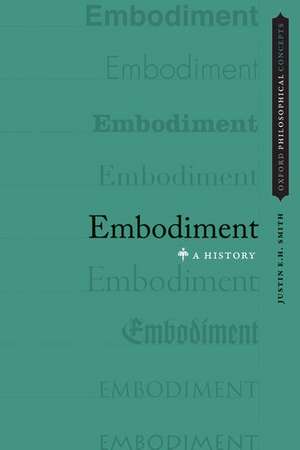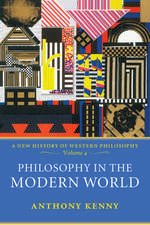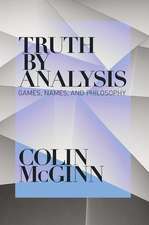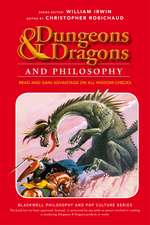Embodiment: A History: Oxford Philosophical Concepts
Editat de Justin E.H. Smithen Limba Engleză Paperback – 24 aug 2017
| Toate formatele și edițiile | Preț | Express |
|---|---|---|
| Paperback (1) | 281.01 lei 31-37 zile | |
| Oxford University Press – 24 aug 2017 | 281.01 lei 31-37 zile | |
| Hardback (1) | 702.36 lei 31-37 zile | |
| Oxford University Press – 24 aug 2017 | 702.36 lei 31-37 zile |
Din seria Oxford Philosophical Concepts
- 13%
 Preț: 279.41 lei
Preț: 279.41 lei - 17%
 Preț: 175.82 lei
Preț: 175.82 lei - 12%
 Preț: 176.80 lei
Preț: 176.80 lei - 12%
 Preț: 189.37 lei
Preț: 189.37 lei - 12%
 Preț: 190.88 lei
Preț: 190.88 lei - 14%
 Preț: 232.70 lei
Preț: 232.70 lei - 14%
 Preț: 231.95 lei
Preț: 231.95 lei - 18%
 Preț: 135.38 lei
Preț: 135.38 lei - 22%
 Preț: 136.35 lei
Preț: 136.35 lei - 14%
 Preț: 295.80 lei
Preț: 295.80 lei - 12%
 Preț: 320.70 lei
Preț: 320.70 lei - 12%
 Preț: 321.29 lei
Preț: 321.29 lei - 14%
 Preț: 315.72 lei
Preț: 315.72 lei - 13%
 Preț: 318.15 lei
Preț: 318.15 lei - 12%
 Preț: 302.59 lei
Preț: 302.59 lei - 5%
 Preț: 282.24 lei
Preț: 282.24 lei - 5%
 Preț: 272.98 lei
Preț: 272.98 lei - 8%
 Preț: 173.62 lei
Preț: 173.62 lei - 13%
 Preț: 253.55 lei
Preț: 253.55 lei - 13%
 Preț: 251.65 lei
Preț: 251.65 lei - 6%
 Preț: 225.52 lei
Preț: 225.52 lei
Preț: 281.01 lei
Preț vechi: 332.01 lei
-15% Nou
Puncte Express: 422
Preț estimativ în valută:
53.79€ • 58.45$ • 45.21£
53.79€ • 58.45$ • 45.21£
Carte tipărită la comandă
Livrare economică 09-15 aprilie
Preluare comenzi: 021 569.72.76
Specificații
ISBN-13: 9780190490454
ISBN-10: 0190490454
Pagini: 384
Dimensiuni: 137 x 206 x 23 mm
Greutate: 0.44 kg
Editura: Oxford University Press
Colecția OUP USA
Seria Oxford Philosophical Concepts
Locul publicării:New York, United States
ISBN-10: 0190490454
Pagini: 384
Dimensiuni: 137 x 206 x 23 mm
Greutate: 0.44 kg
Editura: Oxford University Press
Colecția OUP USA
Seria Oxford Philosophical Concepts
Locul publicării:New York, United States
Notă biografică
Justin E. H. Smith is professor in the department of history and philosophy of science at the Université Paris Diderot - Paris 7. He is the author of The Philosopher: A History in Six Types (2016), Nature, Human Nature, and Human Difference: Race in Early Modern Philosophy (2015), and Divine Machines: Leibniz and the Sciences of Life (2011), all from Princeton University Press.












